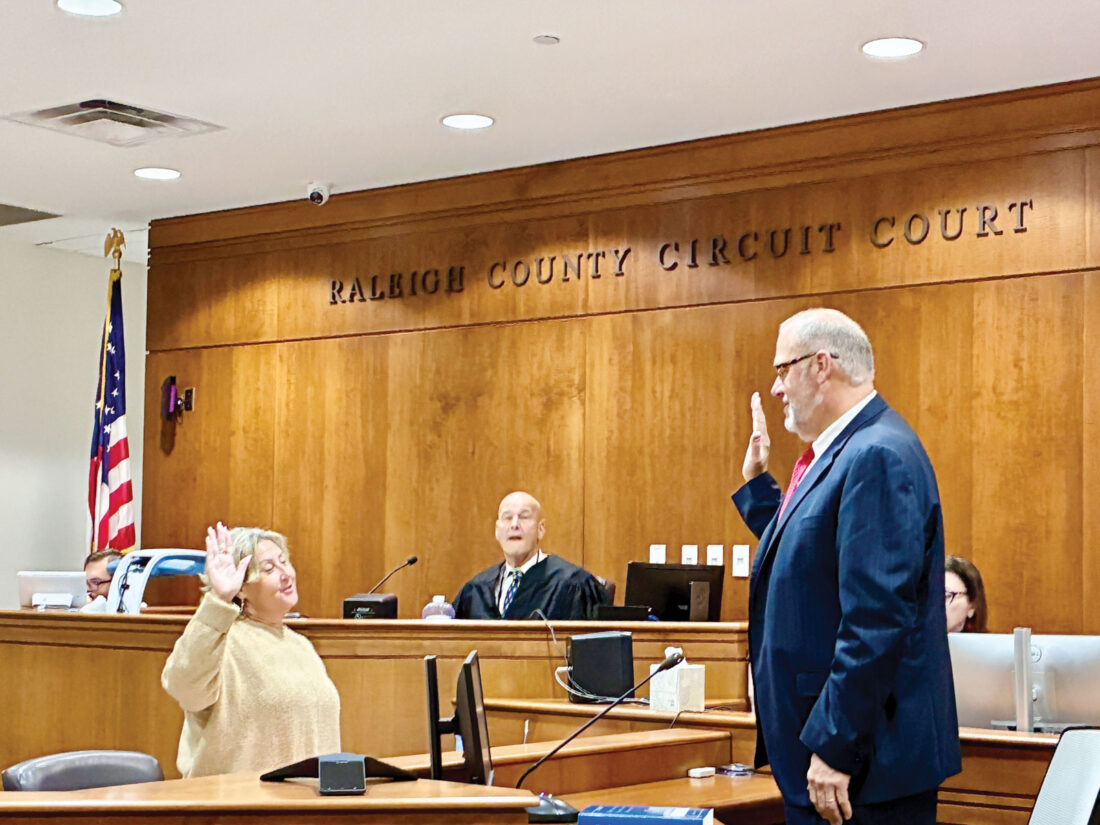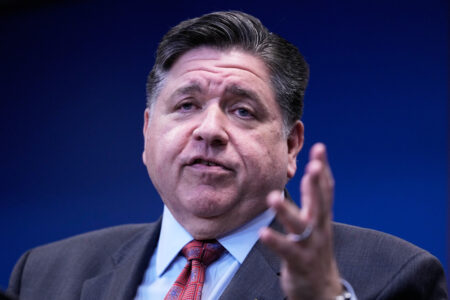Raleigh County religious vaccine exemption lawsuit continues

West Virginia Board of Education President Paul Hardesty, right, is sworn in prior to giving testimony Wednesday morning in a religious vaccine exemption lawsuit in Beckley. (Photo by Steven Allen Adams)
BECKLEY — A Raleigh County judge granted class action status to the more than 570 students granted religious exemptions to West Virginia’s compulsory vaccine law, with the case likely heading for a final conclusion as soon as today. Wednesday marked the resumption of a hearing after a month-long break on a permanent injunction being sought by Raleigh County parents against their local school system and the West Virginia Board of Education. The parents were granted a preliminary injunction in July by 14th Circuit Judge Michael Froble after the state Board of Education voted earlier this summer to instruct all 55 county school systems to continue to follow the state’s compulsory vaccine law despite a January executive order from Gov. Patrick Morrisey allowing the Department of Health to grant religious and philosophical exemptions based on his interpretation of the 2023 Equal Protection for Religion Act. State Code 16-3-4 requires children attending public or private school to show proof of immunization for diphtheria, pertussis, tetanus, polio, measles, mumps, rubella, varicella and hepatitis B unless proof of a medical exemption can be shown. Executive Order 7-25, issued by Morrisey on Jan. 14, ordered the Bureau of Public Health to establish a process for parents and guardians to seek exemptions on religious or conscientious grounds to the compulsory immunization law, allowing for parents to submit to the bureau a signed letter as sufficient proof. Froble’s earlier preliminary injunction against the state board and the Raleigh County Board of Education, currently under appeal to the West Virginia Supreme Court of Appeals, only applied to the parents who filed the lawsuit and did not apply to the more than 570 children who were granted religious exemptions for the current school year. But attorneys for the Raleigh County parents filed a motion on Sept. 16 to turn their case into a class action lawsuit. Other circuit courts across the state are seeing cases filed by parents on behalf of their children when a county school system declines to accept their religious exemption. In two cases, judges in Mineral County and Berkeley County have upheld the state’s compulsory vaccine law. Froble granted the class action motion in a ruling from the bench Wednesday morning, which would only apply to those who already have religious exemptions in hand. “The parties have argued back and forth as to whether this court can do anything outside of Raleigh County, and the court believes it can and will – depending upon the evidence in the case – but does have the jurisdiction to issue a statewide injunction and or declaratory judgment against the State Board of Education,” Froble said. “I don’t in any way accept the argument that we have 55 different categories of education and this court doesn’t have jurisdiction.” Froble also ruled against a motion made two weeks ago by the Attorney General’s Office asking the court to certify a question for the state Supreme Court to answer as to whether the Equal Protection for Religion Act (EPRA) applies to the compulsory vaccination law and whether it requires the state to offer religious and philosophical exemptions to vaccination. “I am not going to certify the question…I think the question is not whether (EPRA) applies, because it does,” Froble said. “We have to find whether (the compulsory vaccine law) burdens the exercise of religious belief. And I believe because it’s a denial of a…religious exemption, the case law is pretty clear. That is a burden on their exercise of religious practice.” After reading filings from all the parties involved in the lawsuit, Froble also ruled that there was no difference between a religious exemption and a philosophical exemption under the law, and he would not be allowing any discovery or any questions of the Raleigh County parents as to whether their religious beliefs are genuine or not. Attorneys for the Raleigh County parents called West Virginia Board of Education President Paul Hardesty to the stand. The state Board of Education voted unanimously in June to require State Superintendent of Schools Michele Blatt to issue guidance to county school systems that they follow the compulsory school vaccination law that does not permit religious exemptions. “The state Board of Education made that determination not to honor religious exemptions regardless of whether someone had a sincerely held religious belief against vaccination, correct,” asked Chris Wiest, one of the attorneys representing the Raleigh County parents. “Yes, sir. The board of education voted in a 9-0 fashion to do so based on the compulsory vaccination law (State Code) 16-3-4,” Hardesty said. “That policy applies to everyone who is seeking a religious exemption across the state.” “And everyone who asks for a religious exemption will receive the same common answer back from the state Board of Education, which is no, correct,” Wiest asked. “Until the Legislature or the courts clarify the situation,” Hardesty answered. During his testimony, Hardesty pointed out that Morrisey’s January executive order provides no guidance or direct orders to the state board, Department of Education, or county school systems. “Governor Morrissey’s executive order is not addressed to the state school board nor to the Department of Education,” Hardesty said. “The words ‘West Virginia Board of Education’ and the words ‘West Virginia Department of Education’ are words that appear nowhere in the text of the executive order.” Later Wednesday morning, the court heard testimony from two parents whose case, originally filed in Kanawha County, was consolidated with the Raleigh County case. Kanawha County parent Marisa Jackson and Dr. Joshua A. Hess, a pediatric hematologist and oncologist practicing at Marshall Health’s Cabell Huntington Hospital, filed a lawsuit in August seeking a writ of mandamus asking the court to order the Department of Health to only administer medical exemptions to the state compulsory vaccine law, cease granting religious exemptions and rescind all granted religious exemptions. Both parents have children with health challenges that make them susceptible to illness. Later Wednesday afternoon, the court heard testimony from Shannon McBee, the state epidemiologist for the Department of Health. Dr. Mark McDaniel, the acting state health officer and commissioner of the Bureau of Public Health within the Department of Health, will testify today as the final witness, with Froble either issuing a decision from the bench today or a written ruling on the permanent injunction at a later date. Steven Allen Adams can be reached at sadams@newsandsentinel.com.





